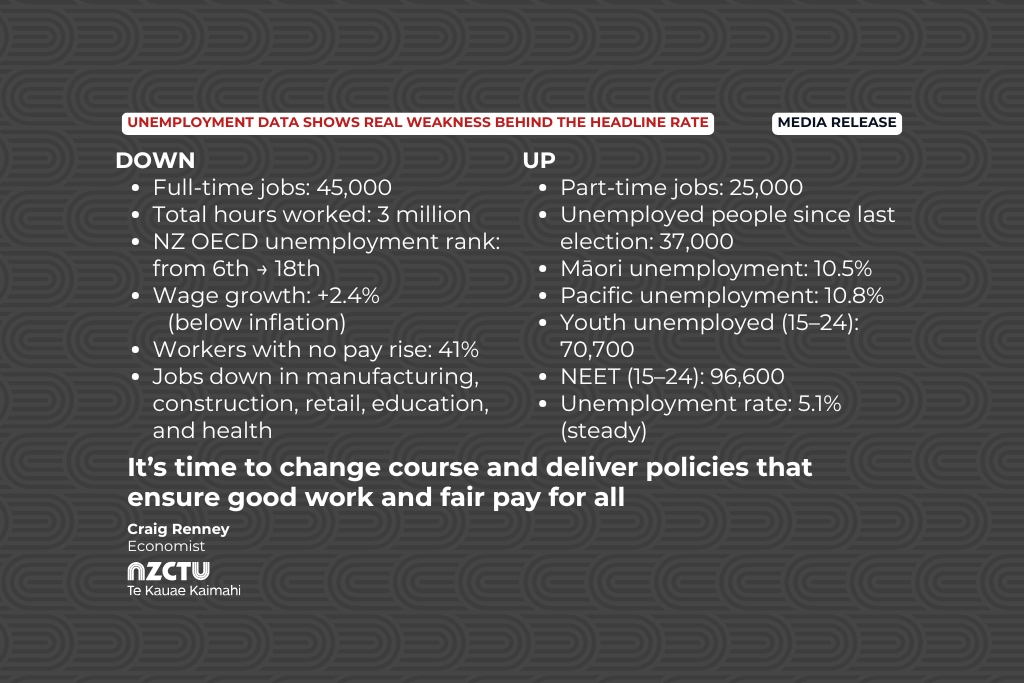Source: Govt’s austerity Budget to cause real harm in communities
HELEN WHITE (Labour—Mt Albert): Thank you, Madam Chair. I was listening really carefully last night. The frustrations of these debates is that often we don’t take the discussion forward, so I want to do a little bit of that today, but I want to make sure that I’m mindful of what you’ve talked about in terms of bringing up new issues.
One thing that came up last night is the issue of exceptional circumstances on the length of time that people are unable to take a claim. What we haven’t really heard is what is envisaged as exceptional circumstances and where it will apply. So I’ve been thinking about some of the cases I had where I was concerned about inequity and how it would apply in those circumstances. So I’ve got a couple of questions: I might take you through a few scenarios and ask you to explain how the new legislation will work.
For example, I had one woman—the case has always haunted me. She was on very low pay and she had been a caregiver her entire career. She had actually worn herself out in the job by lifting, and her employer frustrated her employment because she could no longer lift patients. She would have been in her early 60s. So she was basically just given a termination notice over a time. A person like that—are they a person where they might be able to reopen for that group of people who are of that age? So they’re not going to be able to take a case in their late 60s, because they’re going to be terminated from their employment for a long time—are they a person who might have exceptional circumstances applied to them, because their career is ending, and it might end at a time which isn’t necessarily retirement time even?
So how flexible is the rule going to be in terms of who can reopen the issue because, in fact, their personal circumstances are going to be affected. I heard a lot from the Minister about how we always had to think about the big systems and we weren’t concerned about the individuals. But obviously there’s a real balancing act, and when it comes to something like exceptional circumstances, that is where I’d expect the balancing act to take place.
Now, a similar issue is one about opt-out provisions, because what I heard the Minister talk about was a system—I think this is clause 15—and this is an issue about who can opt out from a multi-employer claim. So take my woman that I’ve just given you—a real human, a multi-employer claim—with her particular provider of care services. Is that employer able to, halfway through a claim, think, “OK, I want to opt out of this claim.” So she’s relying upon a claim that’s being made by many employers at once, or going through a process with that.
The employer that was employing her—are they allowed, under this, to actually leave, and, if so, my understanding is they don’t have to provide reasons as to why they leave, but they leave her high and dry because she’s no longer covered by the claim. It says that they’re allowed to leave without providing reasons, but it’s got to be based on reasonable grounds. Well, sorry, how do we know what grounds it’s based on if they never have to provide any reason? What’s the balance, what’s the check-in place that means that her employer can’t just walk away in the middle of something where that is the only process that she’s got, and not have reasonable grounds? How do we know that there are reasonable grounds?
Then it says—my understanding is that the employer’s decision to opt out cannot be challenged by another party. So is that right? Are we saying that nobody can challenge [Time expired] Sorry, Madam Chair?
CHAIRPERSON (Barbara Kuriger): Helen White. I’ll let Helen White finish her question, but please can you—
HELEN WHITE: I’ll move on to one other point—
CHAIRPERSON (Barbara Kuriger): Yeah, short call.
HELEN WHITE: I hope that you’ve understood that point.
I’d also just like to talk about—and I really, really, would genuinely like an answer over the issue of back-pay. What I got didn’t go far enough into the logic of the situation here. If you’ve got an embargo on the authority awarding back-pay, when that happens and somebody can’t award at the end—and my understanding from the Minister’s answer last night is you can still negotiate back-pay—isn’t the reality that we’re going to see more back-pay claims because there’s no stick, there’s nothing where somebody can award it? And so we’re going to have these people who have 10 years to go for their claim and they’re being discriminated against every one of those years, and it’s an accumulation of harm to them—they’re missing out on all the interest, they’re missing out on all the wages over that time, their KiwiSaver’s being affected, etc. And their employer’s going to go, “Well, what is in it for me, because I do not have to give you any form of back-pay, and you’ve missed out for a 10-year period, and all I have to do is commit on the last possible time I can in that process to something that doesn’t discriminate going forward, and then we’re locking in for another 10-year period before you can go for it again, so I can discriminate for the next 10 years.”
Isn’t that the impact of what is happening, and what I’d like to know from the Minister is: if I’m right, because I’m pretty sure I am, then how is the Minister going to monitor the failure? I suspect what we’ll see is our equity claim change entirely. We’re going to see a wider gap. We’re going to see a wider Pasifika gap, we’re going to see a wider gap in pay. What is going to happen to make sure that if she’s so confident that this isn’t going to cause a problem—what is going to happen in two years? Are we going to see a monitoring of this situation by the Minister to see whether that gap’s growing again, because I’m pretty sure we are going to see a gap growing.
I appreciate the Minister saying it’s very confusing at the moment because we do deal with this in bargaining, as if it’s illegitimate to deal with in bargaining, but we’re not going to necessarily know. Well, what’s the other side of that coin? What processes are being put in place to look at this gap and measure the gap in other ways so that there can be an intervention, and I’m going to go right back and say, “Is this an exceptional circumstance, where we see the gap?”—where somebody like the woman from AUT, who’s the academic in this area and is measuring the gap, sees the gap grow and says to the Minister, “Actually, it’s happening in this sector.” Is that an exceptional circumstance where we might open again, because it seems to me that New Zealand women are going to pay the price for 10 years and then they’re never going to be able to claim back? And this is going to happen. So there’s going to be an adjustment every 10 years, with weak bargaining power, not strong bargaining power—actually, artificially weakened bargaining power. Because under the old law, under the 1970s law, they could’ve claimed the lot. They could have actually gone out and claimed the lot, and what we’ve done is we’ve robbed them today.
So can I please have an answer to those various questions? I appreciate the time that I’ve been given. Thank you.



